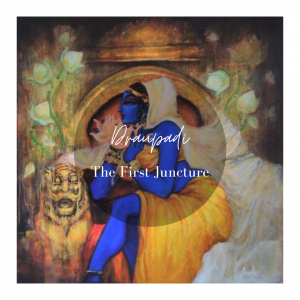
“For men, the softer emotions are always intertwined with power and pride. That was why Karna waited for me to plead with him though he could have stopped my suffering with a single world. That was why he turned on me when I refused to ask for his pity. That was why he incited Dussasan to an action that was against the code of honor by which he lived his life. He knew he would regret it—in his fierce smile there had already been a glint of pain.
But was a woman’s heart any purer, in the end?
That was the final truth I learned. All this time I’d thought myself better than my father, better than all those men who inflicted harm on a thousand innocents in order to punish the one man who had wronged them. I’d thought myself above the cravings that drove him. But I, too, was tainted with them, vengeance encoded into my blood. When the moment came I couldn’t resist it, no more than a dog can resist chewing a bone that, splintering, makes his mouth bleed.
Already I was storing these lessons inside me. I would use them over the long years of exile to gain what I wanted, no matter what its price.
But Krishna, the slippery one, the one who had offered me a different solace, Krishna with his disappointed eyes—what was the lesson he’d tried to teach?”
— Chitra Divakaruni Banerjee from “The Palace of Illusions”
The Mahabharatha was a household book for me, alongside the Ramayana. As compared to the Ramayana, the Mahabharatha took me a few reads before I could remember the names of all the characters.
It was a very straightforward approach of reading when I was younger – there was a bad and good. At the end of the day, the good must prevail.
I held steadfastly on to that belief as I grew up, until I chanced upon the Mahabharatha written under different titles. As such, I grabbed Anand Neelakantan’s Ajaya : The Roll of the Dice and after reading it, I couldn’t sleep properly for days.
It was a great book of course, but it was Duryodhana’s Mahabharatha, not Vyasar’s. I didn’t prepare myself to be exposed to the OTHER side of the coin, and that entire reading experience turned out to be traumatic because it showed me that Duryodhana had his side of the story too. It felt like my childhood had been gripped at its very roots and shook violently.
I asked my father why didn’t he tell me that Duryodhana was not a bad person.
“I didn’t say that Duryodhana was bad, I said he was different. When someone is different, has different beliefs, we all automatically shun them away as bad. It’s a human thing to do.” – he said.
After reeling from the shock and despair that Ajaya created, I realised that I was thirsty for more. I went in search of the Mahabharatha through the eyes of many different characters and I got lucky with Chitra Divakaruni Banerjee’s The Palace of Illusions– Draupadi’sMahabharatha.
Draupadi had been a very effervescent and powerful female character in the Mahabharatha epic. The epic boasts of many robust female characters, Draupadi being a one of them.
Many of us know the basics of her tale – born to Drupatha and alongside Dhrishtadyumna, Draupadi the dusky-skinned princess then winded up having five husbands and became part of a family problem that involved a hundred cousins. She later ends up getting disrobed in their court after her husbands lose their entire kingdom in a freak gambling after which she takes the legendary oath and kickstarts an entire war.
Chitra’s book however, takes turns into roads we may have drove past. How did a woman feel when she was asked to be shared with her husband’s brothers ? Why did she had to take an oath to extract so much of blood and lives in the end ? Chitra puts herself under Draupadi’s light as she aptly answers all of our nagging doubts.
It could be seemingly difficult for many of us to grapple with the truth that there could have been a possibility of certain perspectives. There are always two sides to coin. All we need to do, I realised, is ask.
Post-Navarathri break was a little too long (four days, out of which two I was down with a viral fever and chose to read in bed instead) but it also gave me a chance to revive my writing engine. As we approach the annual fire-walking festival this weekend, we want to remember Princess Draupadi for who she TRULY was – not a goddess but a woman who donned different roles, breaking out of the divisions that mythology had drawn for her.
File Photo : Pinterest.
